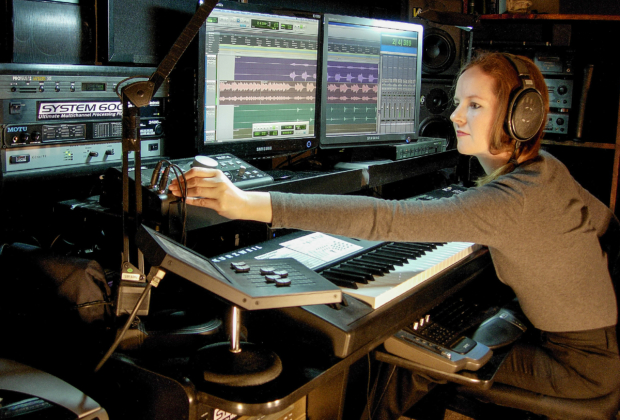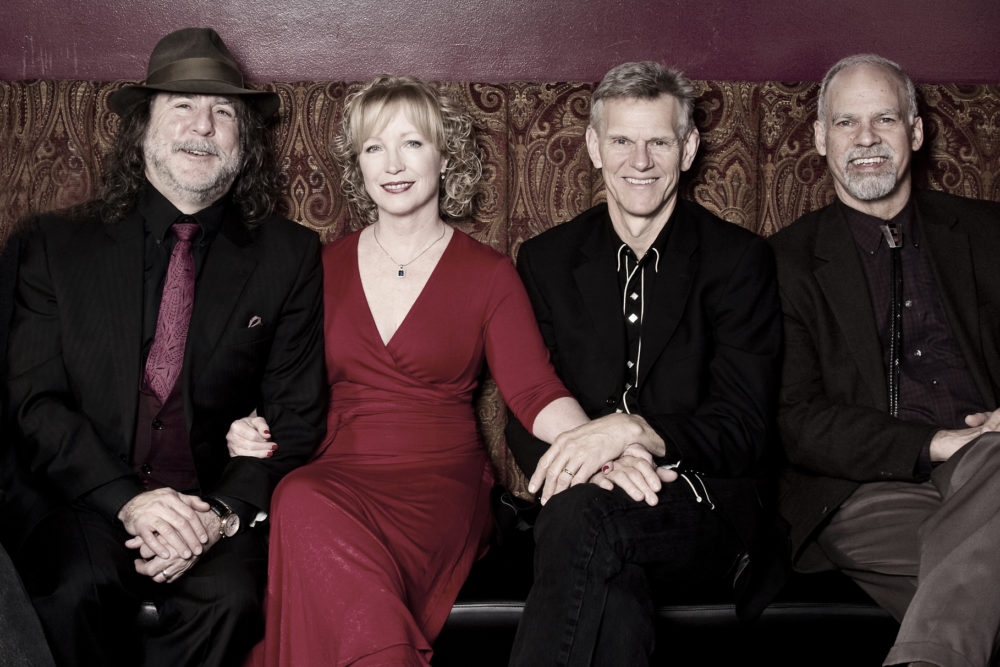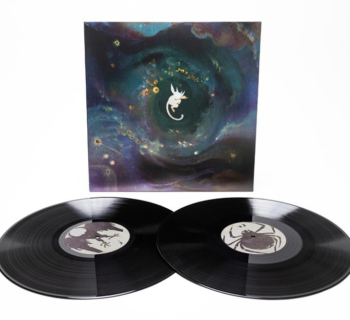This feature story by Andy Mescher originally ran in the August 2018 issue of Music Connection.
Thanks to modern technology, video game compositions have evolved exponentially over the years—from bite-sized chip tunes of the ‘80s programmed in a basement to today’s full orchestral compositions tracked at Ocean Way. And through the rise of video game fandom, the itch for live performances has blossomed. We interviewed five of the busiest composers in gaming to find out how contracts are keeping pace, what it means to partner with sound designers and how to keep your work fresh in an over-saturated field.
Gareth Coker
Titles: Ori & The Blind Forest, Minecraft Mythology Series
MC: How will the music for Ori & The Will and The Wisps differ from its 2015 predecessor?
Gareth Coker: It’s pretty clear from both of our trailers that we have a key second character, which is an opportunity for a new theme. We actually end [the trailer] with the Owl’s theme this time around. So, it’s an opportunity to develop a new melody and then really make sure the music is reflecting what the player is doing, but not feeling gimmicky.
When I say gimmicky––I never, ever, ever want a player to be reminded that they are playing a video game. Jingly sound effects when you have an [item] pick up, like “ding-a-da-ding,” we never have that in Ori. It works in games like Zelda, which is an art style with a completely different aesthetic. But in a game like Ori, which so heavily relies on emotion and atmosphere, I never want to do anything that breaks [that style]. But also change the music enough from moment to moment to make the flow a little bit more interesting for the player.
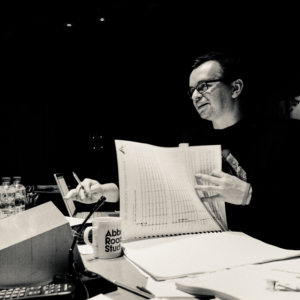
MC: Speaking of sound design, what is the relationship you share with sound designer Andrew Lackey like on both Ori projects?
Coker: I have an amazing relationship with Andy [Lackey] (Matrix, Dead Space). … He respects what music can do, and I respect what sound can do. So, we’re quite good at staying out of each other’s way. In the first Ori, there’s a section that relies on using the glide mechanic and you’re just using the wind basically to get through the level.
For a sound designer, there’s only so much you can do with wind to make it interesting (laughs). So Andy was like, “Gareth, can you do something here with the music, because I’m kind of fed up with this wind.” And most of the gameplay music—excluding the big set pieces—is quite withdrawn. Andy said, “Ori’s just got the last ability at the wind level, you can you can go big on the music.” And so I did. … And it’s those kinds of little exchanges that we’re constantly having a back-and-forth that enable us to have a really smooth and well-balanced audio experience. I don’t think there’s a game out there that sounds like Ori and I’m not just talking about the music I’m talking about the balance between all of the elements.
MC: Ori’s first soundtrack is all over the Internet, including Pandora. How do modern composers negotiate these publishing royalties?
Coker: If there’s nothing upfront, you need to make sure that you have something on the back end. Let’s say you’re doing a game soundtrack for an indie company that doesn’t have any publishing funds, which happens a lot. They really should have no problem giving you 100 percent of the soundtrack royalties… at the very least, 50/50. Chances are it will never get licensed, but you should absolutely put that in a contract––because you just never know what’s going to happen––and then you’re protected if the opportunity does arise. …
Now, of course, if the game doesn’t sell well then no one makes any money. But you’d be amazed at some of the games that end up with sales of over 100,000 units. If that game sold for 20 dollars and you negotiated four or five percent, that can be a year of salary.
MC: Any other contract advice?
Coker: You’ve got to make sure you are credited. … I don’t handle my contracts anymore, but the ones at the beginning of my career I’m just like, “They could [have] literally put anything they wanted.” You’ve just got to assume the worst, and at the end of the day just putting it on paper it doesn’t make you a bad guy, it’s protection for you and protection for them.
Nima Fakhrara
Titles: Detroit: Become Human, 1979 Revolution, Resident Evil Revelations 2
MC: How did you get your start as a game composer?
Nima Fakhrara: Gaming has always been a part of my life. I give all props to one of my amazing close friends and also my previous agent, Koyo Sonae, who introduced me to Capcom [as a composer]. They approached me with the idea of being involved with Resident Evil to build some instruments, and more or less produce their soundtrack. Being a fan of the franchise, I literally said yes right away. And it became a really fun project to do, and then one thing led to another, and I did 1979 Revolution and then did a bunch of VR and AR games for the same company at Ink Stories, and then here we are with Detroit: Become Human.
MC: Detroit: Become Human had three composers, right? How did everyone communicate during the project?
Fakhrara: We weren’t actually allowed to listen to each other’s music.
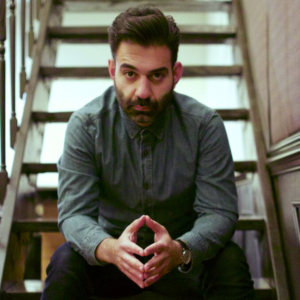
MC: Did you know that was part of the deal?!
Fakhrara: When I was approached for the game, I had no idea there was going to be multiple characters. Once we looked at the contract, that’s when I found out. It was like, “Oh, there are two other composers.” And then it became “Are we actually collaborating? What is the situation?” Because I knew how that works, but then they said, “No, you’re dealing with [the game’s character] Connor. The other two [composers], John and Philip, will deal with the other two characters. You’re not allowed to listen to each other’s music until the very end when there is a character clash. If/when it happens.” But we were discouraged from listening to each other, in order for us to create a unique sonic world.
MC: Was that beneficial in the long run?
Fakhrara: Yeah, absolutely. More power to the creators and more power to David Cage and everyone at the audio team to even have the courage to do that. This could have been just a nightmare (laughs), but it became a very cohesive sound somehow, even though they recorded orchestras, and I chose not to. It became a very interesting sonic palette for the entire game.
MC: One element of the soundtrack consisted of an electronic string quartet… unplugged! What led you to this approach?
Fakhrara: When I decided to do Detroit a certain way, I was like, “Okay I’m going to create these rules for myself and if I can, I will try to stay strict to those rules. I’m going to use everything electronic, and/or they’re going to be handmade, like a human building a robot.” How would Connor actually create his own music, and would he utilize like actual human beings or actual instruments being played by human beings? So it all just came down to... he does calculations versus actually having, I guess, theoretic thoughts of composition.
MC: What’s your relationship with a sound designer?
Fakhrara: I try to be very close with the sound designers. In the world of film/TV/games—in any sort of platform where you’re working together— either one of us could completely fuck each other up (laughs). So, working close with sound designers is very important. And I learned that on Exist, a project with [Director] Eduardo Sánchez (Blair Witch Project). It’s a found-footage film. When I approached him, knowing it was found-footage, the [question was raised]... “Do we actually need to have music and what is this going to do for the film of the found footage?” It would take away from the story. So for me, what was important was to actually create an environment, marrying the music and sound design. So I did a lot of sound design elements in my score, but I still talked to the sound designer in order for him to be in the same key, tempo, etcetera. Even on Detroit, it was a very much of a back and forth with the audio directors and the audio team to be able to come do that as well.
MC: Any advice for composers awaiting that next project?
Fakhrara: Unfortunately, in our world, it’s a never-know situation. I got an email from the music supervisor for Detroit. I loved the announcement at E3, so they basically asked, “Are you interested in this project?”
For our world of film/TV/games, you never know what’s next coming up for you. You have to be able to just create something that’s fresh and try to achieve an original idea. When there’s downtime, I study different instruments [or] I build another instrument. Right now, there is no downtime (laughs).
Jason Graves
Titles: Far Cry Primal, Dead Space series, Moss
MC: How has technology changed the way you compose game music?
Jason Graves: Technology has come a long way. The biggest thing I would say is how much music you can have in a game. Even 10 years ago we were breaking barriers back then with the amount of music that we could stream. I think for the first Dead Space we had four stereo tracks of music that were playing all points in time and they were actually four different pieces of the same music track. And that’s how the score sounded so interactive. And then we had stingers that we could throw on out of RAM that would go on top of those four tracks so you’re really talking about five tracks and they’re stereo, which means 10. So, you’re talking 10 tracks of music on top of all the audio they can play. That was in 2008.
In 2010 for Dead Space 2 that number doubled. So, we had 20 tracks available to us and then it probably doubled again about four or five years after that. Just the sheer amount of music that can be stored in the game and that can be played back at the same time to really help with the interactive experience is just growing exponentially, especially in the last 10 years.
MC: With all this technology at a composer’s fingertips, is it becoming more difficult to convince gaming studios you need an orchestra?
Graves: Most of the time the overall music budget has been set by the time I get hired and sometimes the audio director will go back and try to get some more money if he feels it’s justified, but that doesn’t mean that they’ve decided they want to use live orchestra or not.
An example would be Tomb Raider. They wanted to record all the cinematics with a live orchestra and wanted all the in-game stuff to be MIDI. I’m not a fan of doing that because, to me, that breaks the score up into two completely diverse camps: you’ve got a live orchestra and you’ve got an all MIDI orchestra. I would almost rather do live violins for the whole thing. So at least we have some continuity.
I suggested, “Take the budget that you would have spent [on 60 minutes of live orchestra], and put it toward more minutes of music in the game. I’m going to record all the percussion [at home]; I’m working on my own orchestra samples; I’ll do everything from MIDI. Let me send you some examples of what it would sound like and if we do this we can have a really interactive score and the cinematics will sound like the rest of the score.”
So that’s what we ended up doing and it meant we had three and a half hours of music instead of just 60 minutes.
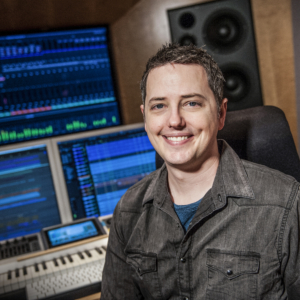
MC: How do you and a sound designer handle sound/music real estate?
Graves: A lot of times if it’s a bigger company like EA there’s an audio director who’s overseeing everything and we will sit down together at the very beginning. One of the first questions I have is: number one, what engine are you using for audio? And number two; what are our limitations for music, because there’s always going to be a footprint that you cannot exceed.
If it’s a smaller game, like with Moss, for example, the audio director was doing the sound effects himself. So we had a close back- and-forth consistently while I was working on the game and it was great because we already understood it was going to be more of a linear two-track stereo experience with a couple of stingers here and there, where with the Dead Space franchise it was a lot more about the interactivity of the layers.
MC: Do you have any advice for game composers struggling to find their next gig?
Graves: If you’re sitting in your studio or you’re out mingling with other game people and in the back of your head the whole time you’re thinking, “…if I could just get that one job it’s going to put my name on the map,” you will never actually realize that you’re there. People ask, “How do you break into the industry?” and I say, “Well, you don’t really break into it, you kind of ooze into it.”
MC: You take unique approaches to composing (Far Cry: Primal, Tomb Raider). Is there ever that fear of remaining unique when beginning a new project?
Graves: Yeah pretty much every time (laughs). … It’s always embracing the fear and I feel like if I’m not 75 percent scared and 25 percent excited, then I’m not trying something different enough. I love having the game inspire the music, both in the instruments and the music that I write and its sound palette, and I always [wonder], “Is this going to work? I think it’s working now?” … I would prefer to have it that way, honestly. I think experimenting and keeping things fresh and really trying out new stuff and learning all the time, at least for me, seems to be something that people continue to ask from me. So, I will happily continue to do it.
MC: Do you have any advice for upcoming composers who are approaching their first contract?
Graves: Regardless of what is trading hands, it’s very important to have a contract, even if it’s just what’s called a deal memo, which can be a single piece of paper. … Maybe the budget is half of what you want. You still put your regular rate in there and at the bottom of your list of assets you have the discount and then the end result is whatever their actual budget is [even if it’s zero]. But they’re visually seeing what you’re worth and you have written documentation of everything. So, if something goes sideways you can always go back to it. You know both parties signed it. It’s just good business to do that.
Winifred Phillips
Titles: LittleBigPlanet, God Of War Saga, Assassin’s Creed 3: Liberation
MC: How has technology changed the way you compose game music?
Winifred Phillips: When I started in video games, there was an attempt to create interactivity in musical scores. Composing music for video games is different from composing for other media, because the music has to react to what’s going on in the game. So there was always an attempt to make the music feel interactive, but the technology behind making music very dynamic and reactive to players’ interactions has increased exponentially as the years have gone by.
So the work has become more complex. There are now quite a few different systems for making music interactive. We break up music into chunks and component parts that we can juggle and rearrange in something called “horizontal re-sequencing.” Or we’ll stem music out into its individual instruments so that it can be mixed into different kinds of sub-mixes on the fly, [which is] vertical layering. I’ve worked with those kinds of systems increasingly as the years have gone by.
MC: Did you use horizontal re-sequencing or vertical layering for LittleBigPlanet?
Phillips: The music is very complex in a vertical layering system, so that really stretched my skills. It was a challenge, but very exciting.
And what was also cool is that the layers of the music were provided to the players because they get to build their own levels, and so they also get to play with your music and create their own sub-mixes and essentially score their own user-created games. I loved seeing what players did with the music I’d composed; it was always very different. And it’s just hearing the music interpreted in a different way or set against a different game, it was a lot of fun.
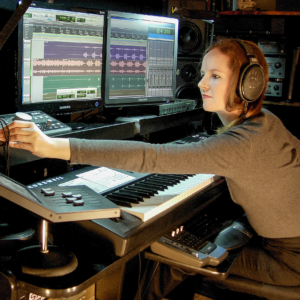
MC: How do you approach composing for a game that already has a film score?
Phillips: I’ve done a lot of movie tie-in games: Da Vinci Code, Speed Racer, Shrek the Third, Charlie and the Chocolate Factory, The Legend of the Guardians. But here’s the interesting thing about creating music for a game that’s going to be tied into a film: The production cycle for a game is very different from the production cycle for a film. So, usually I was hired much earlier than the film composer was hired. And in most cases, I was done with all of my work before the film composer had done anything. So it gave me a lot of creative freedom simply because we didn’t really know what the film composer was going to be doing.
MC: What’s your relationship with a sound designer?
Phillips: Well, it really varies quite a bit between different game teams and development studios. Sometimes, there is just one sound designer, and that is my primary liaison. So essentially, the sound designer is creating the audio guide for the whole game, and we’re talking about what the music should do, and developing an asset list, etc. But if you’re working with one of the larger teams or one of the big publishers like EA or Activision or Warner Brothers, then it’s an entire team full of audio professionals. And there’s usually an audio director who’s overseeing everybody. And that tends to be my point of contact for those projects.
The audio director really has the high vision for what the audio should be, and he’s directing everybody. So there’s a lot of coordination and organization in that, which is nice. It’s great to have a crystal clear vision at the heart of the audio design of a project.
Then again, there are some teams I’ve worked with who have no audio people on them at all. … So I’m talking to someone who is not at all familiar with the language of game audio or music. And that becomes an exercise in learning each other’s vernacular and getting comfortable with each other so that I can find out what that team’s aspirations are and I can try to create music that’s going to fit with their game.
You gotta feel your way through every project. The personal dynamics are different with every team. So it’s good to keep an open mind when you walk into it, ‘cause you never really know what it’s going be like until you get in there.
MC: Do you have any tips for aspiring composers who are about to sign their first contract?
Phillips: I think when you’re signing for your first gig, just take a deep breath. … We were hired because the game developers were excited about what we can do. They heard the music and said, “This is exciting to me. This is something that inspires me. I think this is going to make my game better.” And that’s why we get hired. So, even if there are moments of doubt or frustration, you just have to remember that it started from a really good, honest, collaborative place, and that’s where it’s going to end up. Everybody is going to work together to support each other, and it’s all going to move toward that goal. So you just keep that in your mind, and everything will work out all right.
David Wise
Titles: Donkey Kong franchise, Battletoads, Snake Pass
MC: You’ve been composing games since the ‘80s. How has technology changed the way you compose?
David Wise: The NES was a very basic full-voice sound chip, which is pretty much like a doorbell. There’s two, I think, square wave type sounds and there’s a triangle wave that sounds like an owl… and there is a horrible little noise chip as well, which is very coarse and basic. And all of those channels needed taming. It was quite hard. And everything was typed in, in hex sub-routines, so there would be a number like 81 for the pitch and 089 for the note. It would have to be written out like that for all of the channels. That carried on to SNES as well.
It wasn’t really until we got to the N64 that we actually had MIDI. Moving on to things like Tengami (2014), it’s become very technical. I’m using Cubase and have a good selection of very powerful VST instruments that I can create with. And of course I use quite a few live instruments as well, and it’s nice to integrate those into the composition element of it.
MC: How has your relationship with the sound designers evolved over the years?
Wise: I think the relationship with sound designers is pretty much the same as it was back then. I don’t have to do quite as much programming now, which is nice, but there is still a lot of implementation. [Now] we use Wwise a lot, so often I have somebody who will do [the implementation] for me. But sometimes I have to roll my sleeves up and just get on with doing it myself, though I think that’s the main thing that has changed is I tend not to do as much of the programming type of things I used to.
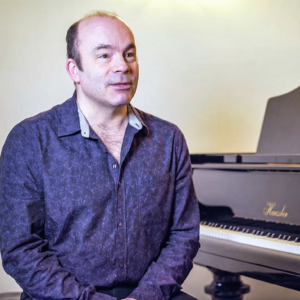
MC: What was it like having to compose video game music for titles like Beetlejuice, which already had a memorable Danny Elfman score?
Wise: I did a couple of games based off films. One of them was Who Framed Roger Rabbit. And that was Alan Silvestri (Back to the Future, The Avengers) who’s an awesome film composer. They sent over the score for his work and it was a huge privilege to be able to get that score—to listen to the music for the film and go through the score and see how he’d done things. And those moments were a gift for a young, aspiring composer because you get to see how they arrived at the solution for a particular cue that they’ve got in the film.
My problem was getting the scores down to four notes—same with Danny Elfman’s Beetlejuice. Not everything is going to work on an NES system. It was a technical challenge. [We were thinking] “How are we going to work around this and produce something that hopefully does some justice to these amazing composers?”
MC: What do you make of your music being streamed online? That couldn’t have been part of the contract agreement for classics like Donkey Kong Country (1994).
Wise: A lot of the work that you do, you’re on a “buy-to-hire.” So basically, [they own the] Intellectual Property. As a composer I am selling my rights to the music. So, for the most part, it’s not really an issue, but yes, going forward it’s one of the things that I’ve been scratching my head about recently: how to monetize. ... You might need, I don’t know, a million plays, before you’re even going to get $20, so the actual process of setting that up and making it worthwhile, almost doesn’t seem worth it.
What I will say though, is that working with a company like Brave Wave music, who I’m doing some stuff with, they’re actually selling CDs and they’re more of a collector’s item. That becomes worthwhile because not only are [fans] buying music, they’re also buying some artwork. They bought something tactile that they can put on the shelf and say, “Yoko Shimoura (Street Fighter II, Kingdom Hearts) did this piece of music, it’s great and here it is on the shelf.”
MC: Did you ever think that these games you’ve created so many years ago would not only be relevant today, but also coming to life in a live orchestral setting?
Wise: It’s a huge compliment when somebody phones you up or sends you an email and says, “Look, we’re putting on this concert. We’re doing some of your music. We’re going to fly you over to Sweden or L.A.,”—or even watching online—and they’ve got this fabulous conductor in, they’ve got this most amazing philharmonic orchestra, and it’s just so incredibly humbling. It’s one of those occasions where you think, “Somebody’s spent an awful lot of energy and money to really celebrate the work that I’ve done 20 years ago.” And it’s just... quite an emotional thing to see. And, yeah, it’s quite a vindication of the amount of work, and I suppose emotional sacrifice, that you made because you were trying to do something that you strongly believed in.
MC: If you could go back and give young David Wise any advice, what would it be?
Wise: I’m not sure I’d be able to offer myself any practical advice. But what I would say is you’ve got to get out and live life, because it soon passes you by. You’re going to be a far better composer if you’ve got something to bring to the table. Have some emotional input to put into your music. You’re not going to get that just sitting in your studio all the time trying to come up with the best thing. You’ve got to get out there and experience and live life.
I sometimes get the impression people would be quite happy for you to take your cues and inspiration from things that appear on YouTube, or TV. But that’s always a very second-hand emotion. I think the strongest bits of music are always those things that have affected you firsthand, so you’ve actually been to a country, or you’ve been in a situation, or you’ve been doing something for yourself, and then you can bring how you felt about living that, to your music.

